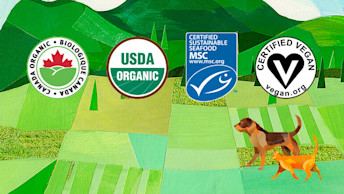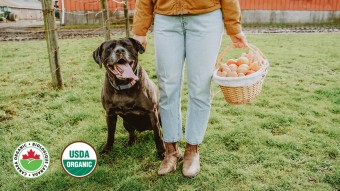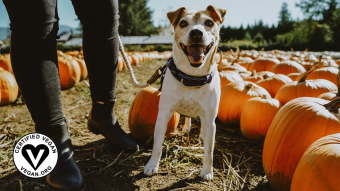July 3, 2021
Pet Food Certifications

Certifications are used in the food industry to provide information to consumers about the way in which a food is produced. Certifications are developed by governments or independent organizations which establish the certification’s ‘standards’. These are the documents that describe the criteria a food producer must meet in order to become certified. To become certified, food producers must undergo a highly detailed audit by an accredited company that determines if the certification standard is being met. The certification cannot be used by the food producer until the auditor determines that all of the relevant criteria on the standard is fulfilled. To maintain certification, most certification bodies require an annual recertification audit.
Many certifications have been developed for the food industry, each having its own unique set of standards. Gather™ dog and cat recipes have received three different food certifications to provide transparency about the ingredients that have been carefully selected for these diets.
Organic
Organic foods are produced using methods that comply with organic farming standards. Organic production is designed to optimize the agricultural ecosystem by focusing on the health of the soil, plants, livestock and people. The primary goal of organic production is to use farming practices that are sustainable and harmonious with the environment. While some certifications have a very narrow focus, organic is a multi-faceted certification that encompasses animal welfare and environmental sustainability, while prohibiting the use of genetically engineered (i.e. GMO) plants or animals.
Key aspects of organic production include:
Soil health: Maintaining and enhancing soil fertility by promoting optimal biological activity in the soil and conserving soil resources.
Pest management: Weeds, pests and disease are controlled through biological and mechanical methods and minimizing tillage. Prior to becoming organic certified, prohibited substances, such as certain pesticides, may not be used on the farm for at least three years.
Crop planning: Crop selection and rotation are used to promote nutrient cycling, recycling of plant and animal residues, water management, attracting beneficial insects and promoting biological diversity. Genetically engineered crops are prohibited.
Humane animal treatment: Livestock are managed using practices that strive to minimize stress, promote health and prevent disease. Livestock are provided with living conditions and space allowances to meet their behavioural requirements and receive organically produced feed.
In Canada, the term organic is regulated by the Canadian Food Inspection Agency (CFIA). Organic standards vary from country to country, but Canada has mutual agreements in place with the United States, European Union, Switzerland and Japan to allow certified foods from these countries to also be considered certified in Canada and vice versa.
National organic standards have not been set for pet food, so the American Association of Feed Control Officials (AAFCO) in the United States recommends that pet foods follow the labelling guidelines for human organic foods. The United States Department of Agriculture (USDA) National Organic Program (NOP) has established four labeling categories for organic products:
100 percent organic: All of the ingredients in the product must be certified organic. Products may bear the organic seal on the packaging.
Organic: Must contain a minimum of 95% organic ingredients. Products may bear the organic seal on the packaging.
Made with organic: Must contain at least 70% organic ingredients. The organic seal cannot be displayed on the packaging, but the principal display panel may state “made with organic ________” and list up to three ingredients.
Specific ingredient listings: Foods that contain less that 70% organic ingredients may only state the organic ingredients in the ingredient statement. These products cannot bear the organic seal on the packaging or state the word ‘organic’ anywhere on the principal display panel.

In addition, in order to include the Canada Organic or USDA Organic logos, the product must be manufactured in a facility that is certified organic. For the Gather Free Acres and Endless Valley recipes, the organic ingredient content is greater than 70% but less than 95% and the manufacturing facility is not a certified organic facility. Thus, we cannot use the certified organic logos on our packaging.
Marine Stewardship Council
The Marine Stewardship Council (MSC) is an independent international non-profit certification organization that promotes sustainable fishing practices. MSC certification is based upon three principles: sustainable fish stocks; minimizing environmental impacts; and effective management. The amount of fish harvested from a fishery must be at a level which ensures that it can continue indefinitely. The fishing operations must be managed in such a way as to preserve the ecosystem. Also, the fishery must comply with the relevant rules and regulations and be adaptive to changing circumstances.

For a product to bear the MSC ecolabel, the entire supply chain, from the fishery to the manufacturer of the end product, is required to undertake independent audits to guarantee that the MSC certified seafood is harvested using sustainable methods and is traceable throughout the supply chain. The MSC only certifies fisheries that harvest wild fish, whereas the Aquaculture Stewardship Council (ASC) certifies fish produced from sustainable fish farms.
The MSC program is the only program of its kind that complies with the best practice guidelines set by the United Nations Food and Agriculture Organization and the International Social and Environmental Accreditation and Labelling Alliance. Several other seafood sustainability programs exist that simply provide recommendations for choosing sustainable seafood. These are not certification programs and do not require third-party audits of fisheries or manufacturers to ensure sustainability of the individual fishery.
Vegan
People choose to follow a vegan diet for a variety of reasons, including ethical, environmental and health benefits. Many vegetarian pet parents wish to feed their pets the same type and quality of food that they feed themselves. Dogs, but not cats, are able to meet their nutrient requirements from a plant-only diet.

Vegan Action is a non-profit organization that has created the Certified Vegan standard to recognize foods that do not contain any animal products. The primary criteria for a product to receive the Certified Vegan logo are that the producer must prove that no ingredients were sourced from animals, no animal testing is permitted, adequate segregation of vegan and non-vegan ingredients must be ensured and adequate cleanout procedures must be followed in facilities that produce vegan and non-vegan products.
This blog was published on October 20, 2016. Last revised July 2021.


